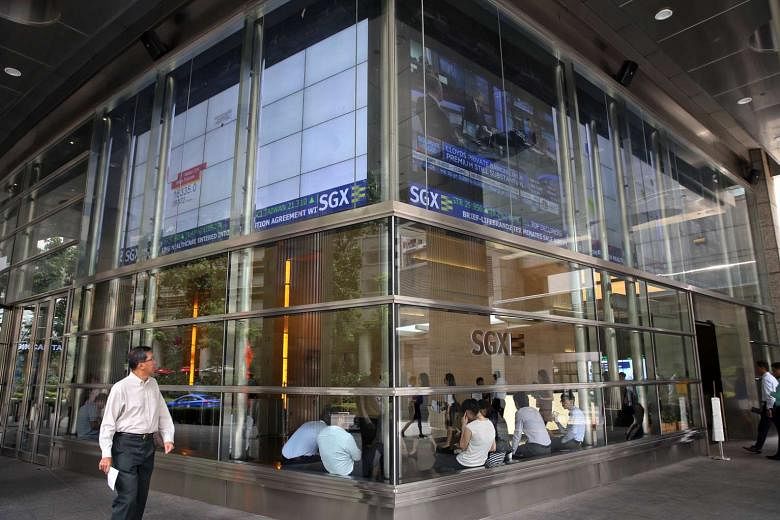It used to be that when you called up your broker to ask him for some advice on what stocks to buy, he would happily give you a couple of tips on what was hot in the market.
If you bought into his spin, you would give him an order and that was it. Life was that simple.
But, the rules have been tightened considerably since the demise of Lehman Brothers almost a decade ago when 9,900 investors here suffered a whopping $520 million of losses from the toxic minibonds concocted by the US investment bank which were mis-sold to them as a "low-risk" investment product.
Nowadays, before a financial adviser sells you anything, he is required to ask you probing questions about your personal financial situation and financial objectives. From that information, he tries to ascertain whether the product he is recommending is suitable for you.
Now, if you are a remisier - a self-employed broker who makes a living off the commissions on the trades executed for clients - you are in a Catch-22 situation.
In giving tips to a client on what stocks to buy, you will certainly be regarded as giving him financial advice. But, it is next to impossible to do a financial needs analysis on your client each time he calls you up for stock tips before he places an order.

That would take too much time even when the market is quiet.
In my experience, getting a proper financial needs analysis done can take as long as an hour.
And, this is the catch: Remisiers find that if they are reduced to mere order-takers, there is the problem of justifying the hefty 0.5 per cent commission charged for trades their clients phone in to execute, since there is little value addition in the service which they provide.
At last, relief is in sight.
In June last year, the Monetary Authority of Singapore (MAS) issued a consultation paper about exempting such "execution-based advice" on what it described as "excluded investment products" (EIPs) from these onerous requirements.
EIPs are considered to be less complex investments, including products such as the "vanilla-type" stocks listed on the Singapore Exchange (SGX), which all investors can invest in, regardless of their investment experience.
The MAS has another category of investments - specified investment products - covering a broad range of products such as covered warrants and other financial derivatives, which are put out of reach of retail investors unless they are "certified" to trade in them.
Following the consultation paper, brokers are being given the go-ahead to give "execution-related advice" on the condition that they explain to their clients why they have made the recommendations.
Essentially, these reasons could revolve around technical or fundamental analysis made by the broker, research reports issued by stock analysts, or developments that have occurred in the market.
In further elaboration, the SGX and the Securities Association of Singapore - which counts broking firms as its members - then came out with a guidance note giving examples of what is regarded as an "acceptable" rationale. This would include, for instance, telling the client that the price-earnings ratio of the company recommended is attractive, or that it is based on a report with a "buy" call on the counter.
Brokers must also keep a record of the rationales of their recommendations, but the choice is left to them as to how they want to do it - whether via telephone recordings of the conversations they have with clients, or jotting them down in a book.
This is a sensible requirement since it also safeguards the broker from any disputes that he may have with the client if the trade turns sour. At least, with the records, he would have the original rationale for making his recommendation to back him up.
The implementation - which is expected to kick off from this month - will require broking firms to notify clients about it, whether by post or some other means such as e-mail if they trade via the Internet.
The biggest merit of this move is to give brokers the means to break away from being a mere order-taker and become more of an investment adviser to help their clients to better manage their investment portfolio, apart from giving them stock tips.
Brokers now face numerous challenges to their business, ranging from online trading, which gives an investor access to other far larger markets such as Hong Kong and New York, to robo-advisers, or automated online advisory platforms, which can tailor an investment plan for an investor at a fraction of the costs charged by a human adviser.
This is unlike the great bull run in 1993, when they enjoyed a virtual monopoly on the local market and anyone who wanted to trade SGX-listed shares had to go through them to execute their orders.
What is more, there will now be more incentive for them to hunt for undiscovered gems among mid-capitalised and small-capitalised stocks with growth potential that they can recommend to their clients, and then deservedly earn a commission if the client buys the stock.
That will surely beat having to compete with market-makers and liquidity providers - who now account for as much as 34 per cent of daily trades - and the whittling down of the bid spreads which makes it impossible for them to make a quick profit when they take a big position on a blue-chip stock as their cost structure is much higher than those of algo traders who use superfast computers to trade.
Not to mention the window of opportunity which opened up with the MAS' change of heart two years ago to allow exchange-traded funds (ETFs) that make limited use of derivatives to be classified as EIPs.
This has enabled the number of ETFs - which are made up of baskets of stocks tracking market indexes such as the Straits Times Index - available for trading by all retail investors to 29 out of the 81 ETFs listed on the SGX.
That is a jump from just nine ETFs that were available to them before the change of rules.
Although ETFs have not taken off in a big way in Singapore, they have gained wild popularity in big markets such as the United States where an astounding US$130 billion was poured into them in just the first two months of this year.
With the ability to offer execution-based advice, ETFs will give brokers a chance to create investment portfolios to suit their clients' needs as well as exposure to countries and assets previously out of reach to the average investor.
In short, it all boils down to the simple fact that, before most people make an investment, they like to discuss what they would like to do before they come to a decision - rather than rely on an impersonal machine to do so - and that is where a broker can make a big difference.
Even with the huge technological strides made in the financial markets, nothing beats that broker-client relationship.
And, if a lunch break is needed to cement that tie, the SGX is willing to go down that route as well.
In the past few months, significant changes have been rolled out to give the Singapore stock market a much friendlier makeover for retail investors. Brokers should make the most of them.


